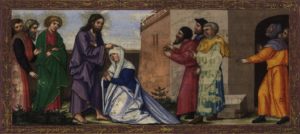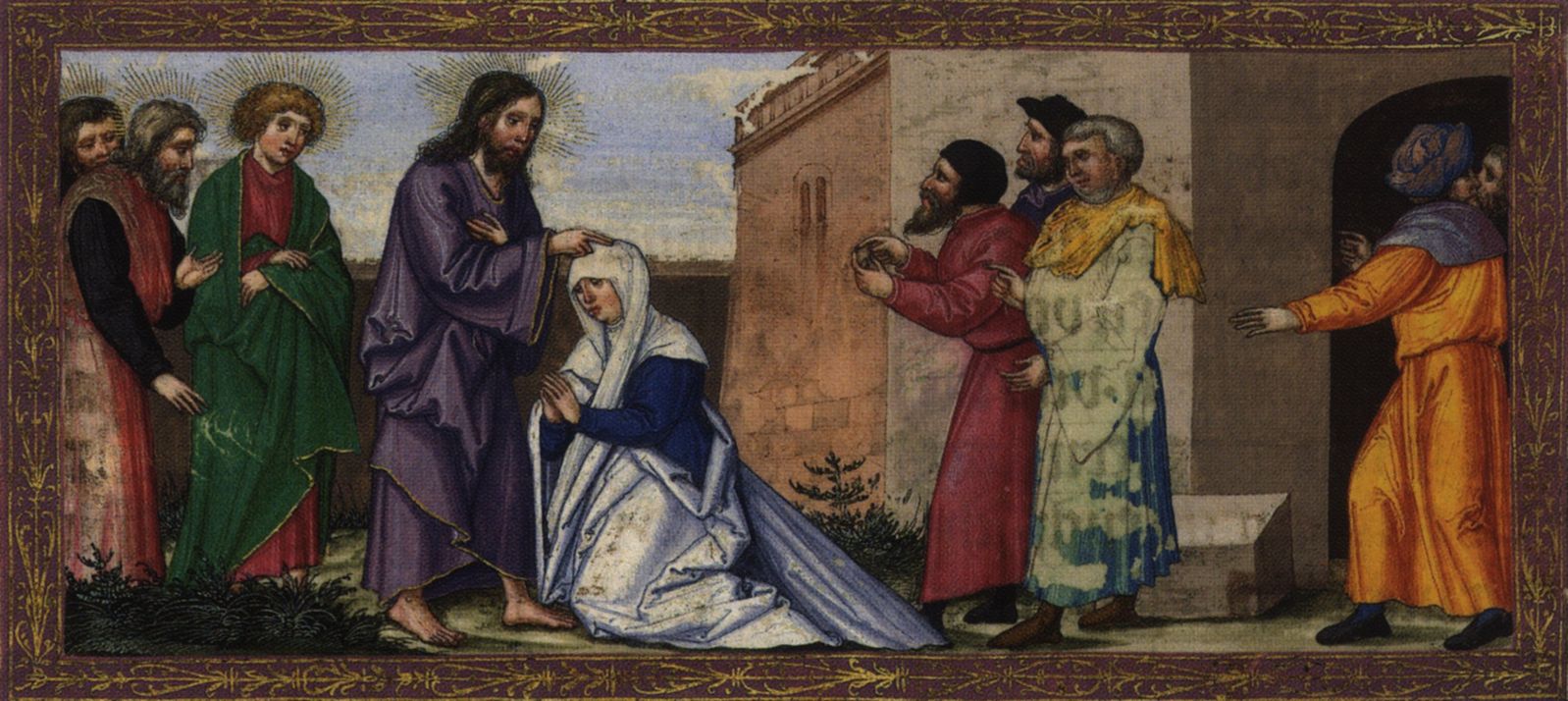
Sabbath realized: Jesus heals the stooped woman.
Now he was teaching in one of the synagogues on the sabbath. And just then there appeared a woman with a spirit that had crippled her for eighteen years. She was bent over and was quite unable to stand up straight. When Jesus saw her, he called her over and said, “Woman, you are set free from your ailment.” When he laid his hands on her, immediately she stood up straight and began praising God.
But the leader of the synagogue, indignant because Jesus had cured on the sabbath, kept saying to the crowd, “There are six days on which work ought to be done; come on those days and be cured, and not on the sabbath day.” But the Lord answered him and said, “You hypocrites! Does not each of you on the sabbath untie his ox or his donkey from the manger, and lead it away to give it water? And ought not this woman, a daughter of Abraham whom Satan bound for eighteen long years, be set free from this bondage on the sabbath day?” When he said this, all his opponents were put to shame; and the entire crowd was rejoicing at all the wonderful things that he was doing (Luke 13:10-17).
A Common Misunderstanding of Sabbath
As the creation story goes, God created all things in six days and rested on the seventh (Genesis 2:1-3). As the story of God’s liberation of Israel from slavery goes, God commanded them to do the same (Exodus 20:8-11), elaborating on that commandment more than the other nine. What does this sabbath rest mean? Why did it matter?
A superficial reading of Jesus’s healing of the stooped woman above (Luke 13:10-17) suggests that Jesus toned down the sabbath. Healing the woman on the sabbath qualifies as work. The religious authorities called him out. Then he counter-called them out for their willingness to work on behalf of an ox or donkey on the sabbath. The apparent point: Morally important work like healing matters more than resting on the sabbath.
Left alone, that interpretation leaves us free rein to justify doing anything we choose on the sabbath. Almost always we justify work as morally good activity. The sabbath becomes meaningless at worst, a sentimental pause God took after a critical week’s work at best.
Jesus Realizes the Meaning Of Sabbath With a Healing
Read more closely: Luke’s telling the story of Jesus healing the stooped woman on the sabbath in Luke 13:10-17 shows Jesus defending the sabbath, not defying it. Jesus’s take on the sabbath and that of the religious authorities differ in their central focus: The leader of the synagogue focused on rest versus work. Jesus focused on freedom versus bondage.
Luke, a physician, offers the diagnosis and etiology in terms of freedom versus bondage: A spirit held her in bondage, held her down, literally, in a stooped, undignified posture for 18 years. Jesus did not approach her as a working doctor, observing, questioning, checking to see if she had the faith to support a miracle. Rather, Jesus reached out like Moses and set her free: “When Jesus saw her, he called her over and said, ‘Woman, you are set free from your ailment.’” (v.12, emphasis mine).
Immediately freed, she exuded freedom, standing up straight, dignified, truly herself again. She praised God – the very heart of any sabbath practice. She stood there the very image of God on the seventh day, enjoying the goodness at the beginning of all things. Suddenly her body that bore witness to a possessing demon bore witness to God who wills our freedom and shalom, the peace and wholeness and harmony that God intended for all creation.
How We Overlook Sabbath Power In Our Midst
Right under the synagogue leader’s nose, the meaning of sabbath flourished almost as on the seventh day, and he did not see it. He and his colleagues had good reason to insist on their position: Occupied by Rome and its Hellenizing agenda, the empirical practice of sabbath observance – not working – kept the Jewish people distinct, along with other practices. People gave their lives for sabbath observance against foreign despots.
So the synagogue leader did not protest out of pettiness or pedantry. But sabbath observance under the watch of the religious authorities became a human project of social and political identity. They sidelined the original meaning.
Sabbath Is About Freedom and Joy
Like the synagogue leader, we get so worked up by threats to joy that we forget the party. We work that seventh day to get ahead, to maximize our gains, to store up more grain before the famine. We fixate on the disease, loss, and death in the cycle of life that we overlook the wonder of life itself.
God created all things including your very self and proclaimed each and every one good. Imagine the delight. Despite all the darkness in our hearts and our history, the delight remains.
God freed the chosen slave nation and gave them Ten Commandments to help them enjoy that freedom. The gratuitous elaboration on the commandment to observe the sabbath implies the subtext: When you follow all the restrictions in this code designed to conserve the blessing of freedom, for goodness sake, take ample time to enjoy the blessing!
So sabbath observance still matters. Unfortunately, it takes a village to observe a sabbath day. To universalize the practice, everyone would have to buy in and support each other. Without direct intervention from God, that will not likely happen in our society.
Practicing Sabbath: A Word From Rabbi Heschel
But the spiritual practice of sabbath remains a very real opportunity for individuals, churches, and synagogues. Daily practices of gratitude, time for prayer and praise, waiting for God and attending to Christ in all things takes us to sabbath observance every day of the week. The key is freedom, freedom from anything that compels us to fixate on threats rather than on God’s liberating love.
And as good as work is, a very real gift in many ways, nothing oppresses our spirits like a compulsion to work. We need to work freely, yes, but we need freedom to let it go. The synagogue leader’s blindness to God had nothing to do with his Jewish faith but with his human anxiety that we all share. Indeed, Christians like me can learn much from wise teachers in the Jewish tradition, and none wrote more wisely on the sabbath than Rabbi Abraham Joshua Heschel:
To set apart one day a week for freedom, a day on which we would not use the instruments which have been so easily turned into weapons of destruction, a day for being with ourselves, a day of detachment from the vulgar, of independence of external obligations, a day on which we stop worshiping the idols of technical civilization, a day on which we use no money, a day of armistice in the economic struggle with our fellow men and the forces of nature—is there any institution that holds out a greater hope for man’s progress than the Sabbath? (The Sabbath: Its Meaning for Modern Man, p.28).
Use your freedom wisely. Detach from anxious toil, and for a brief and sacred moment, put aside the threats. Observe the sabbath each day in some way, remembering that you are a word spoken lovingly into being by God, that for all its tragedies and frustrations and trials, your life is rich with blessings, and that every family member and stranger offers you some acquaintance with the divine. Stand erect and dignified, and praise God with thanksgiving. For you are free.
Blessed are the poor in spirit, for theirs is the kingdom of heaven (Matthew 5:3)
Related Posts
Image: Jesus heals a crippled woman on the Sabbath, Matthias Gerung [Public domain], via Wikimedia Commons


Dr Jenkins: Thank You for this article. LIke so many of your posts it helps to center one’s thoughts and prayers in the right direction. I love the concept of practicing the Sabbath a little bit every day. As a Medical Doctor (now retired) it was often required that I work on the Sabbath. A friend of mine once admonished me for this, being quite upset that I would work on the Sabbath. I answered by saying that I thought it best that my services be available at the Hospital even on the Sabbath. I hope you are doing well. Thanks for your work.
Thank you, Dr. Stiles. You answered your friend well. As I noted in the post, really practicing a sabbath day is not an individualistic affair. It takes a village. And nobody in the village wants a doctor-free hospital any day of the week! If we were a Christian culture (and we are not), we would consecrate sabbath time for everyone in the community. I doubt that time could be simultaneous. Thank you for your ministry and your attention to sacred matters like sabbath time.